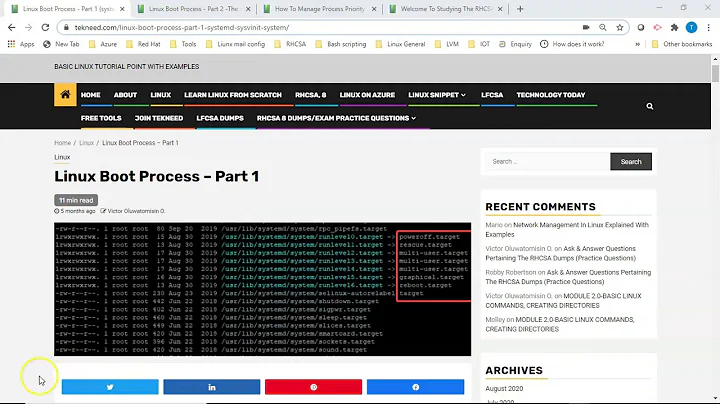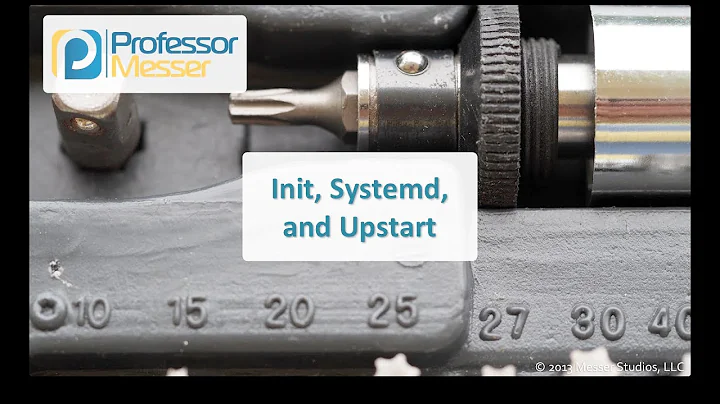How to find out if a system uses SysV, Upstart or Systemd initsystem
Solution 1
You can poke around the system to find indicators. One way is to check for the existence of three directories:
/usr/lib/systemdtells you you're on a systemd based system./usr/share/upstartis a pretty good indicator that you're on an Upstart-based system./etc/init.dtells you the box has SysV init in its history
The thing is, these are heuristics that must be considered together, possibly with other data, not certain indicators by themselves. The Ubuntu 14.10 box I'm looking at right now has all three directories. Why? Because Ubuntu just switched to systemd from Upstart in that version, but keeps Upstart and SysV init for backwards compatibility.
In the end, I think the best answer is "experience." You will see that you have logged into a CentOS 7 box and know that it's systemd. How do you learn this? Playing around, RTFMing, etc. The same way you gain all experience.
I realize this is not a very satisfactory answer, but that's what happens when there is fragmentation in the market, creating nonstandard designs. It's like asking how you know whether ls accepts -C, or --color, or doesn't do color output at all. Again, the answer is "experience."
Solution 2
The init process is always assigned PID 1. The /proc filesystem provides a way to obtain the path to an executable given a PID.
In other words:
nathan@nathan-desktop:~$ sudo stat /proc/1/exe
File: '/proc/1/exe' -> '/sbin/upstart'
As you can see, the init process on my Ubuntu 14.10 box is Upstart. Ubuntu 15.04 uses systemd, so running that command instead yields:
nathan@nathan-gnome:~$ sudo stat /proc/1/exe
File: '/proc/1/exe' -> '/lib/systemd/systemd'
If the system you're on gives /sbin/init as a result, then you'll want to try statting that file:
nathan@nathan-gnome:~$ sudo stat /proc/1/exe
File: '/proc/1/exe' -> '/sbin/init'
nathan@nathan-gnome:~$ stat /sbin/init
File: ‘/sbin/init’ -> ‘/lib/systemd/systemd’
You can also execute it to find out more:
[user@centos ~]$ /sbin/init --version
init (upstart 0.6.5)
Copyright (C) 2010 Canonical Ltd.
Solution 3
This is actually quite a difficult problem. One of the major difficulties is that the places where one most often wants to do this are the places where it's quite likely that one will be in the middle of installing or changing stuff. Another is that there's a subtle but very important difference between the system management toolset that is installed, the system management toolset that is running right now, and the system management toolset that will run at next boot.
Determining what is installed one does with a package manager, of course. But this is complicated by the fact that several systems can be installed side by side.
On Debian Linux, for example, one can install the systemd package, but it is the installation of the separate systemd-sysv package that makes it the active system. The intention is that the systemd and sysvinit packages can be installed simultaneously. Indeed, the Debian Linux crowd has taken steps in Debian 8 to shift towards every program having a different name (/lib/sysvinit/init, /lib/systemd/systemd, /sbin/runit-init, /sbin/minit, /sbin/system-manager, and so forth) for this very reason, that the "non-activating" packages don't conflict on the name /sbin/init. /sbin/init is then a symbolic link to whichever was configured to run at next boot by an "activating package".
Determining what is running now and ready to run next one can only do with a series of toolset-specific tests, with varying degrees of risk from false positives, and with varying degrees of documentation. To check for what system manager is running right now, specifically, one really has to look at the process list or at the various APIs that system managers publish. But this isn't wholly without pitfalls.
General non-starters
Let's start with things that definitely will not work.
-
/proc/1/exewill point to the same/sbin/initwhen either upstart or System 5initare running right now. And on some systems, it's also/sbin/initwhen systemd is running.The Debian Linux crowd wanted to shift towards every program having a different name, as mentioned earlier. But this is Debian-specific, far from universal, and doesn't really help when the program is invoked as
/sbin/init(by the initramfs phase of the bootstrap) anyway. Only Felix von Leitner's minit is actually packaged by Debian 8 to be invoked with its own name. - The existence of the control API file
/dev/initctlisn't specific to System 5init. systemd has a (non process #1)systemd-initctlserver that serves this. Joachim Nilsson'sfinitserves it too. (Just to make things extra fun, on Debian it's now located at/run/initctl. See https://superuser.com/a/888936/38062 for details.) - systemd, upstart, System 5
rc, and OpenRC all process/etc/init.d/, for backwards compatibility in the case of the former two. Its existence does not indicate the presence of any given system.
Detecting System 5 init
Ironically, as explained at https://unix.stackexchange.com/a/196197/5132 , one way on Debian Linux at least for detecting the absence of System 5 init is the absence of /etc/inittab. However:
- This is an side-effect of Debian's way of packaging things like
/etc/inittab. - One part of the overall problem is that
/etc/inittabsticks around if System 5initwas used at any point in the past, because uninstalling the package does not delete its configuration file. (This has been a sizeable problem for Debian 8 work, since there are several packages in Debian 7 which install themselves by adding entries to/etc/inittab.) - It's an inverted test.
Detecting systemd
To check for systemd as the running system manager in the "official" manner, one checks for the existence of /run/systemd/system. This is a directory, in /run, that systemd itself creates at boot, and that other system managers are unlikely to create.
But that's merely unlikely. This check is already broken, because uselessd creates this directory too.
Other, unofficial, checks won't work:
- systemd publishes a whole RPC API over D-Bus, which even contains a version name and number; but:
- This is not covered by the infamous "Interface Stability Guarantee" and could change tomorrow or at whim.
- So too does the lookalike D-Bus server in systemd-shim.
- So too does uselessd.
- The existence of
/run/systemd/privateis similarly not guaranteed and similarly duplicated by uselessd.
Detecting nosh
The system-manager in nosh creates a /run/system-manager directory. But this shares the weaknesses of the equivalent systemd check.
Further non-starters:
- The nosh
system-managerby design doesn't create pipes or sockets in the filesystem, and doesn't have an RPC API in the first place. - The nosh
service-managerconventionally has an API socket at/run/service-manager/control, but one can run the nosh service manager under some other system manager; so this doesn't tell one what system manager is running as process #1. In any case, it doesn't set that name itself; whatever invoked it does. - The existence of a nosh version string, emitted by
system-control version,systemctl version(if one has the systemd compatibility shims installed) andinitctl version(if one has the upstart compatibility shims installed) only indicates the presence of the toolset, as these tools make no query of the running system.
Detecting upstart
Upstart's own initctl makes an API call over D-Bus, and the official check is to both check that one can run initctl and that its output contains the string "upstart" somewhere.
But, like the systemd API:
- There's no guarantee that the API will be around tomorrow or not changed at whim.
- There's no guarantee that some compatibility shim doesn't exist or won't exist in the future.
Indeed, there already is one compatibility shim. nosh has an upstart compatibility package that provides shims for the upstart
initctl,start,stop, andstatuscommands. Luckily (although this was intentional), theinitctlshim does not emit the word "upstart".root ~ #initctl version nosh version 1.14 root ~ #
Solution 4
On RPM-based systems, you can query the RPM database to see what package provides /sbin/init. For example:
fedora:~$ rpm -qf /sbin/init
systemd-216-24.fc21.x86_64
centos:~$ rpm -qf /sbin/init
upstart-0.6.5-12.el6_4.1.x86_64
opensuse:~$ rpm -qf /sbin/init
systemd-sysvinit-44-10.1.1.i586
If you just want the package name, and not version, you could add the --qf option to RPM ("queryformat", not to be confused with the other -qf with one hyphen, which means "query: file"), like this: rpm --qf '%{name}\n' -qf /sbin/init.
On Debian-based systems, you can do a similar thing with dpkg:
ubuntu:~$ dpkg -S /sbin/init
upstart: /sbin/init
And, most package managers will have a similar command. Of course, then you need to know what package manager your distro uses, which might just be trading one problem for another.
Also, on some distros, it's possible that /sbin/init is not the right file to look at, most likely because init=/something/else is given on the kernel command line. Another possibility would be that /sbin/init is a symlink owned by some helper package tasked with switching between init systems, and not owned by any of them directly. One or both of these may be the case on Arch (although I don't have an Arch box handy to check right now).
Related videos on Youtube
Marek Zakrzewski
“The greatest enemy of knowledge is not ignorance, it is the illusion of knowledge.” "Daniel J. Boorstin Member of RedHat Accelerators: https://www.redhat.com/sysadmin/users/valentin-bajrami See also my article on reddit: https://www.reddit.com/r/linux/comments/hxrwfe/stupid_bash_tricks_history_reusing_arguments/ Further contributions at https://mywiki.wooledge.org/BashGuide https://mywiki.wooledge.org/NoClobber http://mywiki.wooledge.org/BashFAQ/094 https://mywiki.wooledge.org/UsingFind
Updated on September 18, 2022Comments
-
Marek Zakrzewski over 1 year
Is there a simple way to find out which initsystem is being used e.g by a recent
Debian wheezyorFedorasystem? I'm aware thatFedora 21usessystemdinitsystem but that is because I read that and because all relevant scripts/symlinks are stored in/etc/systemd/. However, I'm not sure about e.gDebian squeezeorCentOS 6 or 7and so on.Which techniques exist to verify such initsystem?
-
 Admin about 9 yearsSince default installation will only have one init system, wouldn't
Admin about 9 yearsSince default installation will only have one init system, wouldn'tdpkg -l,yumor whatever package manager be enough to identify the init system? -
 Admin about 9 years@YoMismo I'm not sure how I would use
Admin about 9 years@YoMismo I'm not sure how I would usedpkg -loryumto identify the initsystem. On Fedora for example:ps -p 1 -o commandshows/usr/lib/systemd/systemd --switched-root --system --deserialize 20OnDebian wheezythe same command producesinit [2] -
 Admin about 9 years
Admin about 9 yearsdpkg -l|grep systemdgives me an answer when asked in Debian whiledpkg -l|grep upstartdoesn't, so I can say that my Debian install is using systemd instead any other init system. I'm not saying it is the answer, only that testing debian pakages can give an answer, but I can't say about red hat, suse or others. I'm guessing that if only one init system is installed by default then querying packages may give an answer. -
 Admin about 9 years@YoMismo, no. Firstly there is the whole issue that different package management tools have different syntax and may not be used at all. Secondly debian at a minimum may install multiple init systems and switch between them at boot time.
Admin about 9 years@YoMismo, no. Firstly there is the whole issue that different package management tools have different syntax and may not be used at all. Secondly debian at a minimum may install multiple init systems and switch between them at boot time. -
 Admin about 9 yearsI should also mention there are other init systems including BSD.
Admin about 9 yearsI should also mention there are other init systems including BSD. -
 Admin about 9 yearsWhy are you asking, exactly? I mean, you've given us the "if" clause, but what are the "then" and "else" clauses? If it's systemd, then what do you do? If it's upstart instead, what else do you do?
Admin about 9 yearsWhy are you asking, exactly? I mean, you've given us the "if" clause, but what are the "then" and "else" clauses? If it's systemd, then what do you do? If it's upstart instead, what else do you do? -
 Admin about 9 years@WarrenYoung since I work on different platforms, I want to be able to see instantly what initsystem is running on what platform so I can focus on organizing startup scripts, creating and modifying new ones and so on. Eventually I want to modify the
Admin about 9 years@WarrenYoung since I work on different platforms, I want to be able to see instantly what initsystem is running on what platform so I can focus on organizing startup scripts, creating and modifying new ones and so on. Eventually I want to modify themotd(Message of the Day)which tells me what initsystem runs once I log in on a system. -
 Admin about 9 yearsVery handwavy, couldn't you see what process has pid 1 and what
Admin about 9 yearsVery handwavy, couldn't you see what process has pid 1 and whatstringssays about it? For my Ubuntu box here, the results contain "upstart", now it's just data gathering ;) -
 Admin about 9 yearsStrictly speaking, this is not a duplicate. This question asked about Linux operating systems, specifically. The other question included BSDs, MacOS, Solaris, and minix. None of these answers, including mine, address those. With good reason: it would make the already long answers even longer still. Plus it was not the question asked, of course.
Admin about 9 yearsStrictly speaking, this is not a duplicate. This question asked about Linux operating systems, specifically. The other question included BSDs, MacOS, Solaris, and minix. None of these answers, including mine, address those. With good reason: it would make the already long answers even longer still. Plus it was not the question asked, of course. -
 Admin about 9 yearsPrior asking this question, I surely checked if it was asked already. I'm not sure how this question is related to the other one, let alone being a duplicate
Admin about 9 yearsPrior asking this question, I surely checked if it was asked already. I'm not sure how this question is related to the other one, let alone being a duplicate
-
-
Marek Zakrzewski about 9 yearsAlright. I think the answer is acceptable considering the undefined nature of the initsystem. Checking the existence of
/usr/share/upstart,/sr/lib/systemdand/etc/init.d/could help me to write an automated script which somehow will determine the initsystem. Thanks you! -
Warren Young about 9 years@val0x00ff: That's actually why I asked the question in the comment above. When you start doing automatic probing for system features, you have to do so very carefully if you want it to actually be portable. The Ubuntu 14.10 lesson is that you have to do them in the order listed above. This doesn't tell you that Ubuntu 15.10 isn't going to do something else that will break your script, though.
-
Marek Zakrzewski about 9 yearsthat makes sense. I'm aware that there is no 100% guarantee without checking everything carefully. Thanks again for your time and effort!
-
Marek Zakrzewski about 9 yearswow I didn't know about the
-Soption. This gives some more insights about the initsystem. Thanks a bunch! -
 Scott - Слава Україні about 9 years"Also, on some distros, it's possible that
Scott - Слава Україні about 9 years"Also, on some distros, it's possible that/sbin/initis not the right file to look at, ..." So, maybe the full answer is to dops -p1or look at/proc/1to identify the program to query for. (And, of course, usereadlink, if appropriate.) -
Warren Young about 9 yearsThat's a bit chicken-and-egg. That library won't exist on a system without systemd components at least present. You'd have to be using something like autoconf that can check for the existence of the library first.
-
mattdm about 9 yearsBut, RHEL 6 (and therefore CentOS, Scientific Linux, etc.) uses upstart, and
stat /proc/1/exeyieldsFile: '/proc/1/exe' -> '/sbin/init', which doesn't tell you much. -
dbush about 9 years@mattdm: that's odd - on Fedora 21, I get
File: '/proc/1/exe' -> '/usr/lib/systemd/systemd'. -
mattdm about 9 years@Scott Yes, although I think in practice looking at
/sbin/initshould get you the right answer for most rpm and dpkg-based distributions, and others might need their own special-casing anyway. I'm in favor of not engineering in unnecessarily complexity just for theory. (I'll change my mind if you have a good example distro, though!) -
 Scott - Слава Україні about 9 years@mattdm Well, I was just responding to your last paragraph regarding
Scott - Слава Україні about 9 years@mattdm Well, I was just responding to your last paragraph regardinginit=/something/else. -
mattdm about 9 yearsYeah, me too. I think one of the goals with the previous Fedora/RHEL switch from SysVInit to upstart was user invisibility (we never made use of Upstart features, just SysVInit compatibility), and I think that explains it — while systemd is, shall we say, very clear about being new and different.
-
Warren Young about 9 yearsYou're not going to find it on a CentOS 5 or FreeBSD box. I, too, look forward to a world maybe 5 years hence where people have stopped trying to push back the tide, but today, you absolutely cannot count on being able to blindly link against libsystemd.
-
Random832 about 9 yearsWhat might one want to do with this information for which uselessd is not compatible with systemd? A brief look at that site seems to show that it is a "cut-down systemd".
-
sleblanc about 9 yearsThe mere presence of an artifact is not enough to claim that it is in use. On an Ubuntu server I manage,
systemdis installed, yet the machine is still using upstart. -
Amitav Pajni about 9 yearsAnd CentOS 6 technically has upstart, but uses little or no of its features; init scripts are almost all SysV scripts, for instance.
-
Shadur about 9 years@val0x00ff Also possibly useful to know is the fact that all three of the init systems you know can and will honor standard LSB init.d scripts if they're found...
-
Warren Young about 9 years+1, but a couple of niggles: 1) The presence of /etc/init.d does indeed not tell you that SysVinit is the main init system, but it does tell you that you aren't on a traditional BSD box. Put it last in the list of checks, after you've ruled out all the other options. 2) The fact that uselessd mimics systemd in some ways is not necessarily a problem. If you're deciding whether to install a *.service file vs an init script, a check that happens to lump systemd and uselessd together is fine. If you're trying to use one of the features uselessd purposely does not provide, then it's a problem.
-
 terdon about 9 yearsI also get
terdon about 9 yearsI also get‘/proc/1/exe’ -> ‘/sbin/init’on Debian. -
JdeBP about 9 yearsIf you look carefully, you'll see that the question doesn't extend to BSDs. ☺
-
Warren Young about 9 years@JdeBP: Yes, but that's because it's a rather blinkered question, which is why there are so many upvoted answers. There really isn't a simple, good answer to this question. The "right" answer will depend on why one is really asking the question, and what conditions apply. Pointing out holes where the existing answers fail is worthwhile. It reminds me of early Autoconf documentation that pushed you towards
if test x"$y" = "x"instead ofif [ -z "$y" ]because the latter didn't work on the original Bourne shell. When striving for wide portability, you need to be aware of all the traps. -
JdeBP about 9 yearsA question that doesn't fulfil our desire to cover every operating system covered by the site in one massive answer, but limits itself to the several Linux systems that the questioner actually intends to use, is not really "blinkered". There's no simple answer not because the question doesn't ask about operating systems that you want to talk about, but because it's a difficult thing to do (and not just for system management toolsets) . I wrote that above, you'll find. ☺
-
Warren Young about 9 yearsHe's going to write this tool today, and it'll work, and then when he ports it to something else tomorrow, it'll probably break.
-
 Elder Geek almost 9 yearsfor what it's worth,
Elder Geek almost 9 yearsfor what it's worth,stat /sbin/initprovidesFile: sbin/initunder Ubuntu 14.04 -
 askb about 8 yearsThis can also be achieved with simple
askb about 8 yearsThis can also be achieved with simpleps -p 1command, the output should point your toinit|upstartd|systemdprocess, its its init then do/sbin/init --version. -
Daniel Bingham over 7 yearsThis is a terrible answer. Any question could be answered with "experience" but doing so is the epitome of condescension. Your experience gives you an algorithm that you employ to find the answer to this question. For the
ls -cbit, it may be as simple as tryingls -cand seeing if it errors. For this question, there must be some way in which the system records for itself which init system it is going to use. Some configuration file somewhere that can be checked. Your "experience" tells you what it is. Unless you're willing to share it, you shouldn't be posting answers. -
user2718606 over 7 yearsArch Linux also has systemd in
/usr/lib/systemd/systemd(not/lib/systemd/systemd) -
 Phil about 5 yearsThis does not work on docker images running with -it /bin/bash because then bash is the first process to start
Phil about 5 yearsThis does not work on docker images running with -it /bin/bash because then bash is the first process to start






